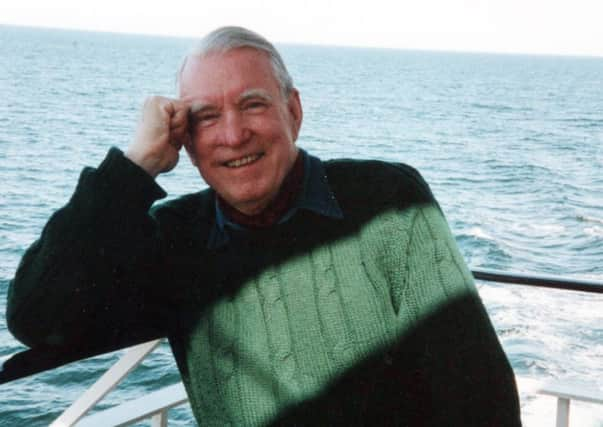Obituary: Lt Col Lionel Gregory OBE, Gurkha


FOLLOWING his family’s military tradition, Lionel Gregory joined the famed and feared Gurkha regiment and eventually became the first commander of the Queen’s Gurkha Signals (QGS), part of the British army’s Royal Signals, before he retired in Edinburgh. His brother Harry (formally known as Lt-Col HCS Gregory) was a commander of the Gurkha Rifles.
But despite the Gurkhas’ fearsome reputation, Gregory, always known as Greg, focused on peace and multicultural understanding, rather than war or weapons. On retirement from the Gurkhas, he set out to improve relations among peoples who had been divided and devastated by war or insurrection, particularly those in Commonwealth countries.
Advertisement
Hide AdAdvertisement
Hide AdWith the encouragement and backing of a family friend, India’s first prime minister Jawaharlal Nehru, Gregory decided to launch a new idea in the 1960s, one that would bring young people face to face – armed with little more than musical instruments, bus-repair tools, sleeping bags, smiles and folk songs – with their peers in other Commonwealth countries. In 1965, he organised and led the first Commonwealth Youth Expedition, which became known as Comex-1.
A dozen more were to follow. Comex-1 was a convoy of buses, full of idealistic students, which drove overland to India. On the surface, it was a bit like Cliff Richard’s Summer Holiday or the Beatles’ Magical Mystery Tour except that it had the serious aim of helping British kids interact with Commonwealth kids. Gregory called his young fellow travellers his “army for peace”.
The first participants included a group from Edinburgh University – among them a future foreign secretary, Sir Malcolm Rifkind – and others from Oxford, Cambridge and the universities of London and Cardiff.
They drove the buses themselves, repaired them when they broke down and formed them into circles at night, not unlike the old wagon trains of the Hollywood Western movies.
While “free love” was happening elsewhere in the world in the Sixties, the women on the Comex convoys slept on the buses while the males slept under the stars, in sleeping bags on the ground inside that circle. Not that “the Indians” in this case were hostile. The Comex convoys were greeted with cheers, gifts, songs and spare parts for their buses wherever they arrived.
While, thousands of miles away, Bob Dylan was doing it in words, and the Haight-Ashbury idealists were doing it with flowers, the Comex crew were doing it on the ground, breaking down international and racial barriers. “With a Song and Not a Sword”, became Gregory’s motto and the title of one of his four books of memoirs, published in 1973. His other books were Crying Drums (1972), Together Unafraid (1979) and Journey of a Lifetime (1997).
“When we got to India, a week later India and Pakistan went to war,” Sir Malcolm Rifkind recalled. “So instead of being able to go back overland, the buses were sold and with the proceeds we flew back home via Russia on a chartered plane.”
Lionel Gregory was born in Surrey on 2 September, 1918, two months before the Great War ended. He never got to see his father, who died in the closing stages of the war. His father had been based in south India and, after his death, Greg’s mother, an Irish woman, returned to their southern Indian home in the Nilgiri mountains to bring up Greg, his brother Harry and sister Esme.
Advertisement
Hide AdAdvertisement
Hide AdThe three siblings loved the Indian subcontinent and it would shape their lives. Greg and Harry, who were almost as close as twins, would go on to serve in the Gurkhas as part of the British Indian Army during the Burma campaign of the Second World War.
Greg later served with the Gurkhas during the Malayan war and was mentioned five times in despatches.
The Gurkhas became a massive influence in his life – and he in many of theirs. He was a staunch supporter of Gurkha veterans’ rights, latterly widely-publicised by the actress Joanna Lumley. In 1959, wishing to use his military experience for peaceful means, he launched the Ten Tors, which became an annual hike over ten tors, or rocky outcrops on Dartmoor, for young people including boy scouts and military cadets.
His dream was to translate his experience of warfare into the lives of young people he hoped would never have to fight. In the words of his wife Annie, he sought “to explore the idea of offering young people… who found themselves caught up in bloody wars… the challenges, the outlet, the sense of achievement and comradeship which Greg himself had experienced, but without the shooting and killing, which he abhorred”.
His Comex expeditions led to the initiation of the Green Pennant awards (which became known as the Little Green Flags), presented by the Duke of Edinburgh and latterly handed out in Edinburgh itself.
“He lived to be an old man, but never seemed so,” his wife told The Scotsman. “Before developing the illness that was to end his life, Greg had been strong, fit and with a youthful vigour and zest, defying age, and outpacing most people decades his junior. He was characteristically dismissive of his increasing lack of mobility and discomfort and, even to the end, looked forward, not back.
“It perhaps was a tribute to Greg himself that the help and care he received from the wonderful district nurses and his GP during his illness was delivered with unwavering, compassionate, competence and cheerfulness. It was, quite simply, the best that anyone could hope for in their last months. Greg had an unshakable Catholic faith and believed profoundly in the infinite goodness of God and the potential of his fellow human beings to leave the world a better place.”
Lt-Col Gregory died at his home in Lennox Street, Edinburgh. He is survived by his wife Annie (née Murray), who worked and travelled with him during those Comex years.